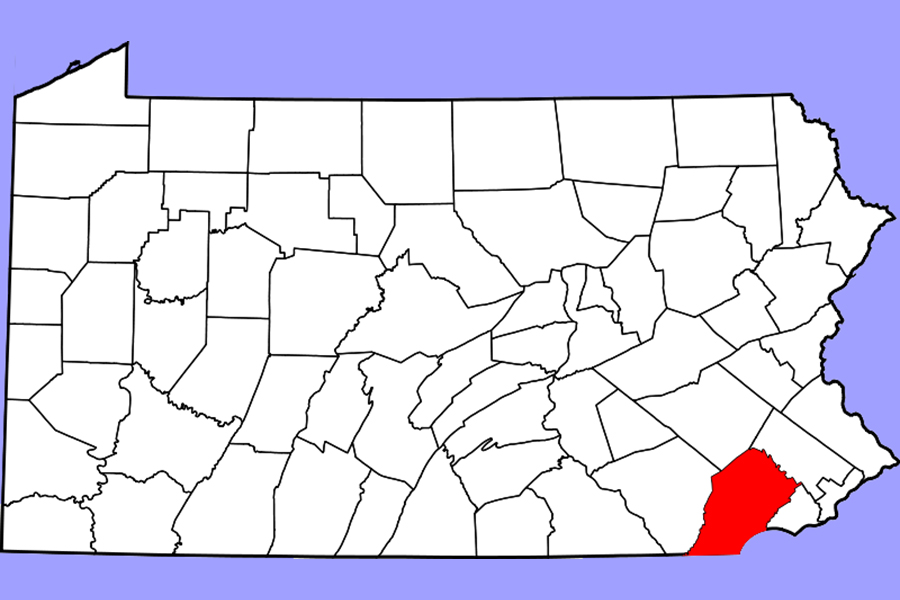David Ruth and Keith Davis, a Chester County married couple, say neighbors filed suit to have their residential fence removed in order to hound them out of the neighborhood.
The couple maintains the fence is necessary for security reasons. But some neighbors contend it’s an eyesore and impermissible in the subdivision.
In late 2014, the couple moved into the Bucktoe Manor subdivision in New Garden Township. Shortly thereafter, they erected a 6-foot residential fence.
According to township records, two neighbors, Scott Bonne and Frank Charlton, lodged complaints about the fence. However, township officials dismissed the complaints as meritless.
In March 2015, Bonne, Charlton and a few other neighbors filed suit in Chester County Common Pleas Court to have the fence removed. The plaintiffs cited a restrictive covenant that allegedly bans such fences in the Bucktoe Manor subdivision.
The plaintiffs claim the Ruth-Davis fence exceeds the height limit by 2 feet, was constructed with improper materials and impermissibly extends onto the front portion of the property.
A daylong hearing regarding the dispute was held June 7. Chester County Common Pleas Court Judge Jeffrey R. Sommer must decide whether the fence can remain.
According to the couple’s GoFundMe page, “A group of neighbors has banded together to bring a frivolous lawsuit against our two-father family because of a homophobic agenda to get us to leave the neighborhood.”
The couple seeks to raise $50,000 from the public to help defray their legal expenses. At presstime, they raised close to $6,000.
The property at issue is owned by Lelaine and Xiao Gao, who reside in North Carolina. The Gaos are renting the property to the couple on a lease-purchase basis, according to court records.
For their part, Ruth and Davis claim selective enforcement of a “defunct” covenant that’s been broken in various contexts by more than 12 families over the past 15 years.
Their fence has been vandalized, anti-LGBT slurs have been hurled at them and their children, and “Get Out Fags!” has been painted on their garage doors, according to their GoFundMe page.
“This has affected our family emotionally and financially, as well as our children’s well-being due to their confusion, anger and mistrust over the vandalism — in addition to this case making it difficult for them to make friends, after becoming the ‘talk of the school bus,’” the page states.
According to township records, police have been summoned to the Ruth-Davis household on at least four occasions due to complaints by neighbors about barking dogs on the property.
The barking-dog complaints were filed by neighbors Kara Carpenter and Doug Semmel, who are plaintiffs in the civil suit regarding the fence.
In response, Davis told police that neighbors were continuing to harass his family by making the 911 calls. No citation was issued, according to township records.
“On Aug. 15, 2015, there was a call from the Ruth-Davis family stating they heard gunshots outside,” said township manager Anthony Scheivert. “Police responded and it was found to be fireworks coming from another housing development nearby. That was the only other call pertaining to [the property] since Jan. 1, 2013.”
Ruth and Davis couldn’t be reached for comment for this story. Their attorney, Mary Ann Rossi, declined to comment. “This matter is under consideration by Judge Sommer,” Rossi said in an email. “I do not comment on pending litigation.”
As of presstime, Sommer hadn’t issued a ruling.
Attorney L. Theodore Hoppe Jr. represents four families who filed suit to have the fence removed.
Hoppe emphasized that his clients aren’t motivated by anti-LGBT animus, nor did they commit any vandalism on the property at issue.
“This dispute has nothing to do with the defendants’ sexual orientation, nor their being in a same-sex marriage,” Hoppe told PGN. “My clients have no problem with the Ruth-Davis family being in the community. That’s not the issue at all. They’re welcome there. The issue is: The lawfully recorded restrictive covenant that binds every home in the community prohibits that type of fence. It’s just not allowed.”
Hoppe said his clients have a legitimate concern about the fence.
“If you look at that neighborhood, the fence is so completely different from every other fence in that neighborhood,” Hoppe concluded. “It completely changes the character of the neighborhood.”

